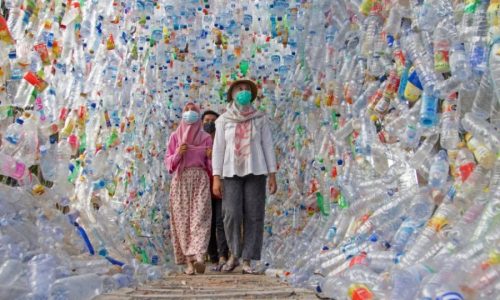A new study by the Center of Economic and Law Studies (CELIOS) reveals the serious impact of the food estate project in Merauke on Indonesia’s carbon emissions.
The study says the clearing of up to 2 million hectares of forest for this project is expected to result in additional carbon emissions of 782.45 million tons of CO₂, equivalent to a carbon loss of Rp47.73 trillion (US$3.007 billion). This finding emphasizes the risk of an emissions spike that runs counter to Indonesia’s commitment to achieve Net Zero Emission by 2050.
The CELIOS study also finds that the project not only drives an extreme increase in Indonesia’s carbon emissions, but also has the potential to increase Indonesia’s global contribution to carbon emissions from 2-3 percent to 3.96-4.96 percent or a 2-fold increase.
This impact creates a major challenge for global efforts to curb climate change. This large-scale carbon release policy also has the potential to reduce confidence in Indonesia’s commitment within the framework of the Paris Agreement, which is to achieve a temperature increase limit of 1.5 degrees of Celsius.
“Assuming Indonesia’s carbon emission contribution increases by 2-3 percent due to the food estate in Merauke, we could potentially lose 5-10 years to reach the Net Zero Emission target by 2050,” Media Wahyudi Askar, Director of Public Policy at CELIOS, said as quoted in a statement on Tuesday, December 10, 2024.
“This is a warning bell that massive development policies without considering environmental impacts can backfire. They wil not only negatively affect indigenous Papuans, but also accelerate the global climate crisis.” he said.
The project is also considered contrary to global efforts to reduce carbon emissions. The world is currently trying to reduce emissions to keep the earth’s temperature rise below 1.5°C. However, the megaproject in Merauke contributes significantly to the increase in global emissions.
Forest Watch Indonesia (FWI) revealed that the development of a food estate in Merauke, South Papua, has led to massive deforestation. In the past year, forest destruction in South Papua has more than doubled to 190,000 hectares (2022-2023) or almost three times the size of Jakarta.
Deforestation
The organization says that food estates are a driver of deforestation because they are built on natural forests and carried out by destroying Papua’s forests.
“All projects, including food estates, carried out in Papua must get prior recognition and approval from the indigenous Papuan people through FPIC (Free, Prior and Informed Consent). This principle can ensure the sustainability of natural resources and the rights of indigenous Papuans are met,” Anggi Prayoga, an FWI campaigner, said.
Meanwhile, CELIOS proposes concrete measures to prevent further deforestation, including the development of restorative economic products that utilize biodiversity without destroying forests. This approach not only supports economic growth, but also creates green job opportunities that support local communities.
The CELIOS study highlights that preserving forests and developing a restorative economy is a more sustainable solution. With this approach, Indonesia’s global emissions contribution can be reduced to only 1-2 percent, while making Indonesia a strategic buffer for global carbon sequestration.
CELIOS emphasizes that environmental restoration-based solutions are more in line with Indonesia’s sustainable development vision and climate targets. In addition, the restorative economic model also strengthens food security from sustainable sources.
It is feared that if Indonesia continues to ignore environmental impacts in development, it risks not only losing its global reputation, but also suffering greater economic losses in the long run.
Currently, massive land clearing has already begun in South Papua. Given the serious implications of this project for carbon emissions and the future of the climate, CELIOS recommends a halt to the food estate policy in Merauke.
“The government needs to explore more sustainable, community-based economic solutions that can provide economic benefits without sacrificing the region’s forests and critical ecosystems,” it concluded.









